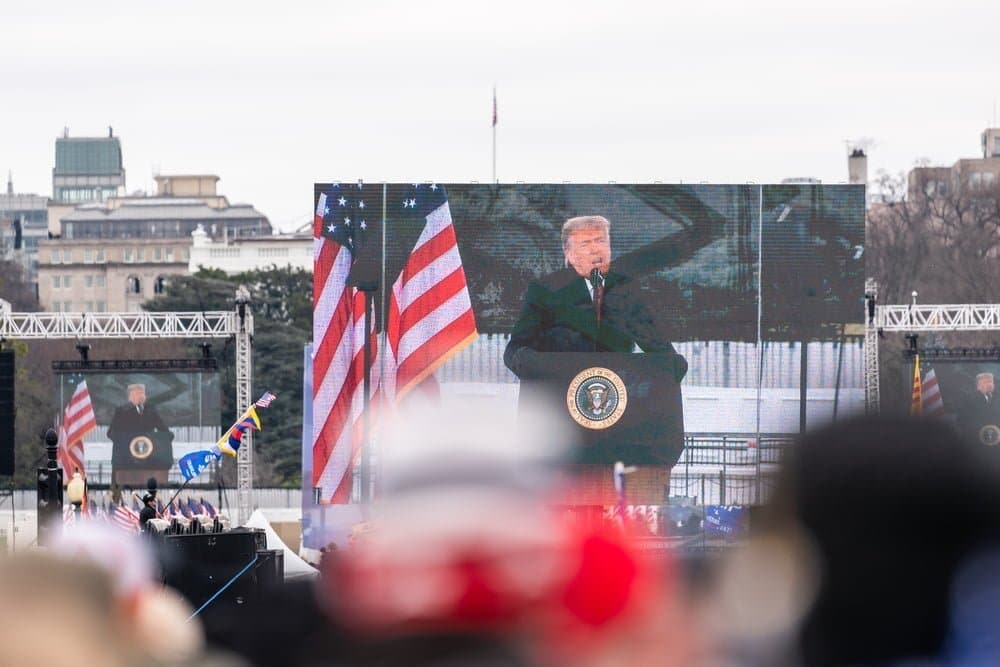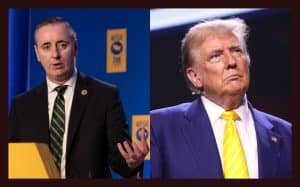Written by Alexander Karn
In his now-classic study “The Language of the Third Reich,” German scholar Victor Klemperer observed how Nazi rhetoric altered the thinking of ordinary Germans and subverted traditional values. Besides its resentments and scapegoating, Nazism was at its core a linguistic barrage, which Klemperer immediately recognized as dangerous.
“If someone replaces the words ‘heroic’ and ‘virtuous’ with ‘fanatical’ for long enough,” Klemperer wrote, “he will come to believe that a fanatic really is a virtuous hero, and that no one can be a hero without fanaticism.”
More recently, writers and pundits who have observed former President Donald Trump at his campaign events have noted the increasing coarseness of his language and the dehumanizing vocabulary he uses to vilify his rivals and outline his plans for a vindictive second term.
Not all of this is new. Consider the Access Hollywood tape, recorded in 2005, in which Trump bragged about sexually assaulting women who appeared in the orbit of his celebrity. But what has changed is that Trump now leans into this revolting language rather than seeking to distance himself from it, as he tried to in 2016 with a video-recorded statement of “regret,” saying his crude remarks “don’t reflect who I am.”
Back then, Trump understood that his gleeful misogyny and rapacious musings might become a political liability, whereas the Trump of 2024 has brought “locker room talk” into the very heart of his political speech and rhetoric. It is now a customary part of his public appearances to launch into profane tirades about his opponents or assert his intention to use the National Guard or the U.S. military to exact retribution against his political opponents, who he has described as “sick” and “radical left lunatics.”
Just as troubling, the former President recently characterized the January 6 insurrection as “a day of love.” Questioned about this choice of words by Fox News’s Howard Kurtz, Trump claimed his supporters were peaceful and unarmed and that nobody was killed on the Capitol grounds.
Through sheer force of will and linguistic deceit, Trump erases the history of what happened that day. In his telling, there were no mock gallows, no zip-tie handcuffs, no pistols or chemical irritants. And the deaths of seven people that have been linked to the melee? They didn’t happen.
The dead are risen. The beaten and wounded are untouched. The mob members who brutalized law enforcement are viewed with adoration. Trump’s language coils around itself like a serpent. Words feast on themselves. Darkness is light. The nation’s shame is Trump’s pride and joy. The call was perfect.
Such word games are not compatible with democracy. It matters what leaders say and whether their words steer toward the truth or away from it.
READ: Rod of Iron Festival in Pennsylvania Still Pushing MAGA Conspiracies, Hate, and Extremism
We think, feel, and live through language. We craft our politics through language. A nation is constituted by its memories and proclamations and its values, which, in the end, we must locate in language.
Klemperer understood this: “What happens if the cultivated language is made up of poisonous elements or has been made the bearer of poisons? Words can be like tiny doses of arsenic; they are swallowed unnoticed, appear to have no effect, and then after a little time, the toxic reaction sets in.”
Trump’s toxic use of language can only sicken the body politic. His inability to abide by broadly shared facts is taking us to the brink. It needs to stop.
This column was produced for Progressive Perspectives, a project of The Progressive magazine, and distributed by Tribune News Service.
Alexander Karn is an associate professor of history at Colgate University in upstate New York. He is the current convener of the Historical Dialogues, Justice, and Memory Network (www.historicaldialogues.org).






